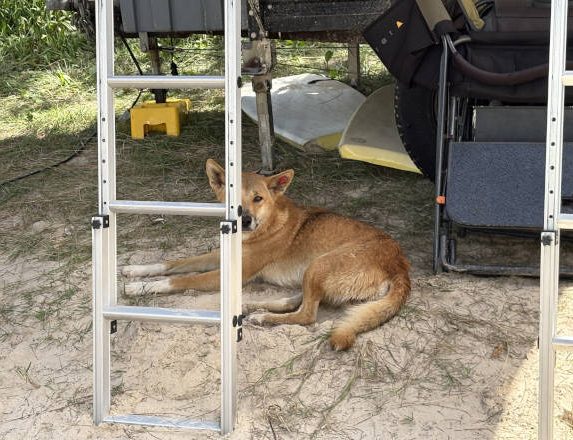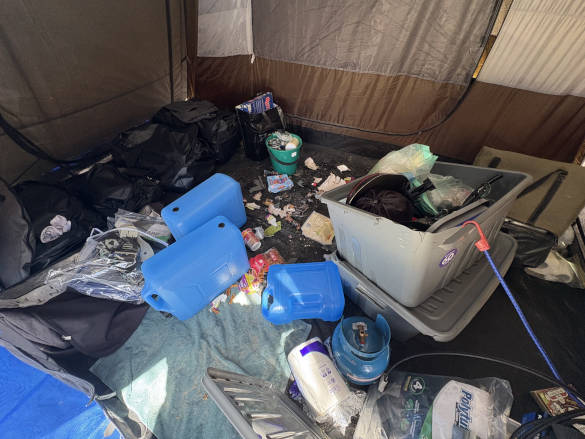A new series of photos have revealed just what opportunistic feeders dingoes on Queensland’s K’gari (Fraser Island) are … and just how incredible their sense of smell is.
Taken by rangers from the Department of Environment, Tourism, Science and Innovation (DETSI), the photos show the results of food and rubbish being incorrectly stored by campers.
Dr Linda Behrendorff said dingoes recently gorged themselves on accessible food and rubbish after breaking into a tent and then began hanging around the camping area.
“Dingoes are opportunistic by nature and have torn open tents, can chew eskies open and knock over bins before ripping rubbish bags apart,” she said.

When opportunity knocks ... a dingo lurking around a K'gari campsite. PIC: DETSI

Dingoes totally ransacked this camper’s setup. PIC: DETSI
“Wildlife scavenging around camping areas is a common occurrence, and the problem with leaving food or rubbish where dingoes or other wildlife can get it makes them less fearful of humans.”
Dr Behrendorff said dingoes didn’t differentiate between food and rubbish, and they can start approaching people for food … which puts dingoes and people at risk.
“Even in fenced areas, campers must ensure that all food and rubbish is stored in strong, secure containers and kept in an inaccessible place, such as a vehicle cabin or an enclosed ute tray,” she said. “A tent or annexe is not a secure place, and dingoes have also taken people’s belongings such as clothing, toiletries or shoes that carry the smell of food.”

A dingo with a stolen peanut butter jar. PIC: DETSI
DETSI is asking everyone to secure their camping areas, secure their food and shoo dingoes away if they’re lingering nearby.
It said bins are provided on K’gari, and people are encouraged to use bins properly and never leave bags of rubbish beside bins.
Reasons to prevent dingoes getting access to food and rubbish:

A dingo has a good look around an unattended campsite. PIC: DETSI
Food availability: There is plenty of natural food for dingoes on K’gari. They are opportunistic predators, and if food is readily available in the form of rubbish, they will likely scavenge for it, especially if it is easier to obtain than hunting.
It is an offence to deliberately or inadvertently feed dingoes. On the spot fines include $2,580 for deliberately feeding a dingo and $464 for food availability. The maximum court-imposed penalty for feeding dingoes is $26,614.
 WIN ONE OF THREE SKID ROW TRAILER SKIDS
WIN ONE OF THREE SKID ROW TRAILER SKIDS
Grey Nomad members are being given the opportunity to win one of three Skid Row Trailer Skids (each valued at $199). The ingenious Australian-designed device could come to the rescue of nomads who find their trailer or van stuck on sand, mud, or worse.
Manufactured from high-grade polypropylene, the ‘skid’ has been designed for use with or without the jockey wheel to accommodate different conditions in the retrieval process. The device is very compact (77cm x 39cm x 21cm), making it easy for grey nomads to store, and it weighs just 3.8 kilograms.
Click here to find out more.
The Wildlife on Kgari deserves a chance.Less campers more wildlife i say.Add the beaches too along the Queensland coast as they are being damaged and taken over by 4WDrivers driving all over them with no regard for people or wildlife.
Time to rethink our Nature strategies.
Happy Nature Happy camping
Brendan
I’m with you Brendan – although I can’t help but notice what a big money earner K’gari is for the State Govt, Parks and Wildlife, and the local community. I’m not a fan of the 4Wdrivers on beaches either – but, having the parks useable and shareable, providing income and jobs – is better all round for the parks themselves.
Just cut the number of visitors to 10% and the environment will be so much better off. Man does not have to inhabit every square inch of the planet. Poor old mother nature has a hard time dealing with the earths cancer known as man..
Agree 200%
We were at Ayres Rock….and some “well meaning” green type left food out for them in caravan park…..didnt her partner give her an ear full
What’s a “green type”? Is it fair to label someone politically because they did something they shouldn’t? Many people mistakenly look at a dingo’s lean physique and think they’re hungry. Then there’s those folks who just think the rules don’t apply to them.
Green type = naive tree hugger
Absolutely nothing do with a political party who happen to have a “green” label
When will people get it Dingoes are wild life , K’gari is their territory not humans , we are only visitors there. Children should be banned from K’gari. And when people have to stay in a compound to visit why bother let the dingoes have it .
You seem to forget they have lived around humans for at least 5000 years.
You are wrong it’s 65000 years last count.
Helen they have only been here for 5000 years. First dingoes came as fresh meat on canoes . They are Asian Wolves and there heaps of them in places like Bali
A K’gari dingo ripped open the window fly on my tent and dragged my large suitcase out the hole and halfway down the road. The dingo had smelt that the bag had food in it. In fact, the bag was used to carry snacks to camp but those food items had been removed and stored safely in the boot of the 4WD. But it goes to show that the smell of the food lingered on the bag and was enough for the dingo to investigate. I learnt then, my next trip to K’gari will see that ALL food is stored in plastic tubs from the get go.
Try that over in US with the bears, cougars and mountain lions, could end up way worse than scavenging a camp site.
Use common Sense
Only the lead and copper type.
Simple solution, shut Island down to humans, just let the dingos and other native animals live there.
Perhaps it’ s time to start training these dogs to stay away from campsites. Makeshift camps can be set up with sensors that would activate traps or ear piercing sounds, etc to scare them off. In Sri Lanka villagers set off firecrackers to keep elephants at bay.
Dingoes are inquisitive. Even the wildest and remotest dingoes have the curious nature of domestic dogs. For safety never turn your back and run away, They naturally kill kangaroos by chasing them!!
Well they say their is a natural food source . Can that be explained. We have an excess of roos in our local coastal towns of Maaroom, Boonaroo & Poona. What would be the problem putting more natural food source of roos on the island